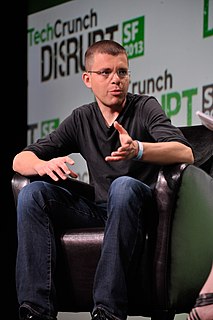A Quote by Caterina Fake
Entrepreneurship works on the apprenticeship model. The best way to learn how to be an entrepreneur is to start a company and seek the advice of a successful entrepreneur in the area in which you are interested. Or work at a startup for a few years to learn the ropes.
Related Quotes
"Why is the creative entrepreneur the riskiest type to be?" I asked. "Because being creative means you are often a pioneer. It is easy to copy a successful and proven product. It is also less risky. If you learn to innovate, create, or invent your way to success, you are an entrepreneur creating new value rather than an entrepreneur who wins by copying."
The most important job of the entrepreneur begins before there is a business or employees. The job of an entrepreneur is to design a business that can grow, employ many people, add value to its customers, be a responsible corporate citizen, bring prosperity to all those that work on the business, be charitable, and eventually no longer need the entrepreneur. Before there is a business, a successful entrepreneur is designing this type of business in his or her mind's eye. According my rich dad, this is the job of a true entrepreneur.
The Lean Startup isn't just about how to create a more successful entrepreneurial business, it's about what we can learn from those businesses to improve virtually everything we do. I imagine Lean Startup principles applied to government programs, to healthcare, and to solving the world's great problems. It's ultimately an answer to the question: How can we learn more quickly what works, and discard what doesn't?
I think the hallmark of a really good entrepreneur is that you're not really going to build one specific company. The goal - at least the way I think about entrepreneurship - is you realize one day that you can't really work for anyone else. You have to start your own thing. It almost doesn't matter what that thing is.
I have a bad rote memory, but I tend to learn through my experiences. And then when I went into the markets, and then starting my business as an entrepreneur, that affected my thinking a lot, too, because in order to be successful as both an investor and an entrepreneur, one has to be an independent thinker and bet against the consensus and be right. Because the consensus is built into the price, and if you're not an independent thinker in the markets you won't succeed. And if you're not an independent thinker as an entrepreneur starting out, you're not going to bring anything special.
It's an amazing time to be an entrepreneur because not only is the stuff getting more capable and powerful, but it's becoming more reliable and the costs are coming down dramatically. So you can go out as an entrepreneur and start a company on a credit card and go to AWS and a few other services and be pretty virtual and, who knows, you may be the next Steve Jobs.
You can be entrepreneurial even if you don’t want to be in business. You can be a social entrepreneur focused on the not-for-profit sector. You can be an agriculture entrepreneur if you want to change how people think about farming. You can be a policy entrepreneur if you want to go into government. The idea of an entrepreneur is really thinking out of the box and taking risks and stepping up to major challenges.
I was surfing the Internet, and I came across a school in Atlanta where you could learn how to climb trees with ropes the way the pros do. It sounded terrific, and so I went down there, and I began to learn these kind of rarified techniques for how you get up and down trees while using special ropes and gear.


































